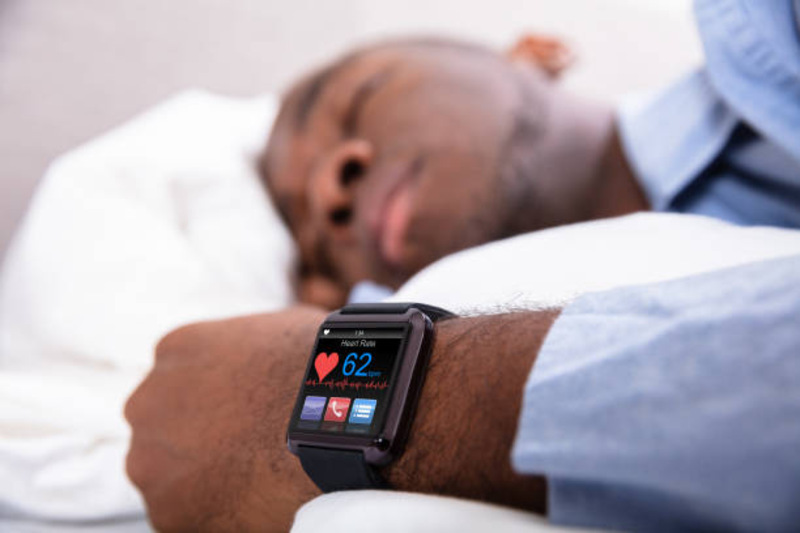Understanding the Role of Wearables in Sleep Tracking: A Deep Dive
Nov 07, 2023 By Madison Evans
If you're looking for a way to accurately and easily measure your sleeping habits, then wearables could be the answer. With the emergence of more advanced sleep tracking technologies, it's now easier than ever to monitor performance in terms of restful sleep hours, track changes over time, and get an idea where improvements can be made. In this blog post, we'll dive deep into how exactly wearables are leading the charge when it comes to helping individuals better understand their sleeping patterns - from discussing the benefits they offer to exploring a few popular devices on today's market. Ultimately, no matter what trends come out on top or fade away with time, wearable technology is proving itself as one of the best resources for gaining insight into our slumber.
Exploring Wearables and Sleep Tracking:
Sleep is crucial for our health and overall well-being. But how can we ensure that we are getting enough quality sleep? With the rise of wearables, sleep tracking has become more accessible than ever before. By collecting data on our sleep patterns such as duration, quality, and consistency, wearables can provide insights into our sleep behavior that we might not have been aware of otherwise.
Whether you’re a fitness enthusiast or just curious about your sleep habits, exploring wearables and sleep tracking can help you make adjustments to your lifestyle that could improve your sleep and lead to a healthier you.
Identifying the Benefits of Sleep Tracking:
Sleep tracking has become a popular trend in recent years as people seek to understand and improve their sleeping patterns. The benefits of tracking your sleep are multifold. It can help you identify any disruptions in your sleep, detect underlying health issues, and optimize your sleep quality and duration.
By monitoring the amount and quality of your sleep, sleep tracking enables you to fine-tune your sleep environment, habits, and routine to make the most of your time spent resting. It can also provide valuable insights into your sleep patterns, including how often you wake up during the night, how much deep and REM sleep you get, and how long it takes you to fall asleep.
Types of Wearables for Sleep Tracking:

Sleep tracking has become increasingly popular as people strive to improve the quality of their rest. One of the most intriguing ways to monitor sleep is through wearable technology. There are now numerous wearable devices on the market designed specifically for sleep tracking, ranging from simple wristbands to advanced headbands.
Smartwatches:
One of the most popular types of wearables for sleep tracking is smartwatches. These wrist-worn devices offer a range of features, including heart rate monitoring, sleep stage tracking, and personalized insights and recommendations. Some models can even track your breathing patterns and analyze your sleep quality based on movements throughout the night.
Fitness Trackers:
Fitness trackers, also known as activity trackers, are another well-known type of wearable device that can track your sleep. These devices typically have sensors to monitor physical activity and heart rate, which can provide data on how long and how well you sleep.
Smart Rings:
A newer addition to the wearables market is the smart ring. These compact devices are worn on your finger and can track sleep patterns by measuring heart rate, breathing patterns, and temperature fluctuations. They are discreet and comfortable to wear, making it easy to collect data without any disturbance.
These devices use a variety of sensors and algorithms to detect and analyze various aspects of sleep, such as duration, quality, and cycles. Whether you prefer a discrete wristband or a more immersive headband, there are plenty of options to choose from when it comes to sleep-tracking wearables.
How to Choose the Right Wearable for Your Needs?
Wearable technology has come a long way since the days of the calculator watch. There are now countless options for tracking your fitness, monitoring your health, or simply staying connected without ever having to pull out your phone.
Consider Your Goal:
Before purchasing a sleep-tracking wearable, think about your main goal. Are you primarily interested in tracking your overall sleep quality or focusing on specific aspects such as deep sleep or REM cycles? Understanding what you hope to achieve can help narrow down the options.
Check for Compatibility:
Some wearables are designed to work exclusively with certain devices or operating systems. Be sure to check compatibility before making a purchase to avoid any potential issues.
Consider Your Comfort:
Since you'll be wearing the device while sleeping, comfort is crucial. Look for options that are designed with soft and breathable materials to ensure maximum comfort throughout the night.
Read Reviews:
Researching and reading reviews from other users can provide valuable insights into the performance and features of different wearables. This can help you make a more informed decision when choosing the right one for your needs.
Set Your Budget:
Wearables range in price from budget-friendly options to high-end devices with advanced features. Set a budget before purchasing and consider which features are most important to you to find the best fit within your price range.
Understanding the Data and Statistics Collected Through Wearables:

Wearable technology has become a popular trend for tracking physical activity and monitoring health. With all of the data and statistics that can be collected through wearables, it's important to understand how to interpret the information for maximum benefit.
By analyzing things like heart rate, steps taken, and sleep patterns, wearables can provide valuable insights into a person's overall health and fitness. It's important to remember that the data collected is just one piece of the puzzle. In order to create a comprehensive picture of your health, it's important to combine wearable data with other factors like diet and lifestyle choices.
The Impact of Using Wearables for Sleep Tracking on Overall Health and Well-being:
Sleep is a crucial component of maintaining a healthy lifestyle. As technology continues to advance, wearables designed to track your sleep have become increasingly popular. These devices provide users with valuable insights into their sleep patterns, allowing them to understand how much quality sleep they are getting each night.
This information can help improve overall health and well-being. Sleep tracking wearables can also provide data on factors such as heart rate, breathing, and movement during sleep. Armed with this information, users can make changes to their sleep environment, bedtime routine, and daily habits to optimize their sleep quality.
Conclusion:
The use of wearables for sleep tracking can be a great way to get insight into your overall health and well-being. With the right data, resources, and knowledge of different types of wearables, you have the power to make more informed decisions about your sleep hygiene and lifestyle habits. Ultimately, understanding how to choose a wearable that fits your needs is key to seeing results. So start exploring wearables today and make those small changes that will lead to a healthier you in the long run. Together we can create better sleep practices for ourselves and strive towards better health while improving our overall quality of life.








